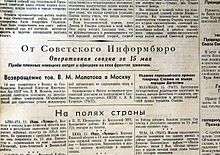Soviet Information Bureau
Soviet Information Bureau (Russian: Советское информационное бюро [Sovetskoye informatsionnoye byuro], commonly known as Sovinformburo [Совинформбюро]) was a leading Soviet news agency, operating from 1941 to 1961.

Operation
The Axis invasion of the Soviet Union started on 22 June 1941, opening the Eastern Front of World War II. On 24 June 1941 a directive of Sovnarkom and the Central Committee of the Communist Party of the Soviet Union established the Sovinformburo "to bring into the limelight international events, military developments, and day-to-day life through printed and broadcast media".[1]
During World War II the Sovinformburo directed the activity of the All-Slavonic Committee, the Anti-Fascist Committee of Soviet Women, the Anti-Fascist Committee of the Soviet Youth, the Anti-Fascist Committee of Soviet Scientists and the Jewish Anti-Fascist Committee (JAC). In 1944 a special bureau on propaganda for foreign countries was set up as part of Sovinformburo.[2] In 1961 the Sovinformburo was transformed into Novosti Press Agency which was succeeded by RIA Novosti in 1991 and, in 2013, by International Information Agency Russia Today.
Yuri Levitan made the radio announcements on Radio Moscow (known for its "Wide is My Motherland" call-sign). While Radio Moscow always started its announcements with the words "Moscow is speaking" (Govorit Moskva), during the Axis aggression against the Soviet Union in World War II broadcasts came from Sverdlovsk (today Yekaterinburg) until 1943, when activity moved to Kuibyshev (present-day Samara) until 1945.
The Soviet Information Bureau never announced the fall of Kiev in 1941.
Radio announcers
See also
- Eastern Bloc information dissemination
- Censorship in the Soviet Union
- Propaganda in the Soviet Union
References
- Sovinformburo during WWII Archived 2006-10-13 at the Wayback Machine
- Mass Media in Russia Archived 2000-09-03 at the Wayback Machine